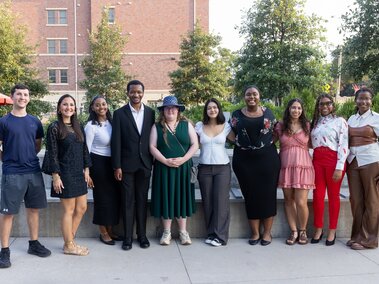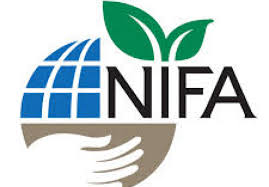REEU: Expanding Opportunities in Agricultural Sciences: Crop-to-Food Innovation
Description
This 10-week summer REEU in Crop-to-Food Innovation will allow students to integrate fundamental science discovery with its translation to understand the steps from crop trait inception to commercialization of new food products based on those novel traits. Student research projects will involve collaborations across two or more of the components of our Crop-to-Food Innovation Pipeline, which will allow students to gain a broader perspective on their research projects and appreciate the steps from product inception to prototype development to application evaluation.
As part of the training, the students will begin their research training by completing a 1.5-week Biotechnology Training Camp (BTC) which will provide students with an overview of fundamental laboratory skills and knowledge including basic molecular biology methods, routine microbiology, and biochemistry applications. Our program will also provide complimentary professional development and leadership skills training that focuses on science communication, outreach, and entrepreneurship.
See the list below for associated mentors and projects.

Benefits
- Competitive stipend: $6,500
- Suite-style room and meal plan
- Travel expenses to and from Lincoln
- Campus parking and/or bus pass
- Full access to the Campus Recreation Center and campus library system
- Wireless internet access
Learn more about academic and financial benefits.
Events
- Department seminars and presentations
- Professional development workshops (e.g., applying to graduate school, taking the GRE)
- Welcome picnic
- Day trip to Omaha's Henry Doorly Zoo and Aquarium
- Outdoor adventures
- Research symposium
Program Contacts
For information about this program contact:
Edgar Cahoon: 402-472-5611 • ecahoon2@unl.edu
Director > Center for Plant Science Innovation
Who Should Apply

Related Fields of Study
- Plant Breeding and Biotechnology
- Biochemistry
- Analytical Chemistry
- Bioprocess Engineering
- Food science
- Human and Livestock Nutrition
Eligibility
Participation in the Nebraska Summer Research Program is limited to students who meet the following criteria:
- U.S. Citizen or Permanent Resident
- Current undergraduate with at least one semester of coursework remaining before obtaining a bachelor's degree
See Eligibility for more information.
How to apply
Follow the application steps to submit the following materials.
Mentors and Projects
Mentors and Projects
| MENTORS | PROJECTS |
|---|---|
Prof. Jennifer M. AuchtungFOOD SCIENCE & TECHNOLOGY | Health Benefits of Microbiome, Diet, and Host Interactions My laboratory will train undergraduate students in approaches to identify traits of crops that may enhance health benefits by altering the functions of members of the human gastrointestinal microbiome. Currently, our lab is working to understand how interactions between the microbiome, diet and host contribute to human health. Student research projects will involve collaborations across two or more of the components of our Crop-to-Food Innovation Pipeline. |
Prof. Andrew BensonNEBRASKA FOOD FOR HEALTH CENTER | Affects of Genetic Variation in Grain Crops on Human Gut Microbiome My own research program is focused on understanding how genetic variation in grain crops can affect bioactive components that ultimately have effects on the human gut microbiome. Depending on student’s interest, the REEU participants will have the opportunity to work with any of my lab staff and students who are currently mapping Microbiome-Active Traits (MATs) in Sorghum, Maize, and Common Bean. There are also opportunities for field and greenhouse work, as well as laboratory work using some of the most state of the art automation and robotic systems available for microbiome research. There are also opportunities for undergraduates to participate in the computational and statistical analysis required for the massive amounts of data that are generated. REEU students would have outstanding mentoring and extraordinary opportunities to explore a wide range of research methodologies and approaches. Student research projects will involve collaborations across two or more of the components of our Crop-to-Food Innovation Pipeline. |
Prof. Catelyn BridgesBIOLOGICAL SYSTEMS ENGINEERING, FOOD SCIENCE & TECHNOLOGY | Post-Harvest Engineering and Crop Quality My research focuses on post-harvest engineering and crop quality — exploring how crop processing impacts both producers and consumers, and finding ways to reduce food waste around the world. |
Prof. Nathan ButlerAGRONOMY & HORTICULTURE | Using Biotechnology for Crop Improvement The overall mission of my lab and the Plant Transformation Core Research Facility (PTCRF) is to develop new technologies for crop genetic improvement and support collaborative research towards engineering regenerative and resilient crops for food, biofuel and specialized metabolite production. Our approaches towards accomplishing this mission include:
|
Prof. Edgar CahoonBIOCHEMISTRY & CENTER FOR PLANT SCIENCE INNOVATION | Biochemical and Genetic Basis for Immense Chemical Diversity in Plant Lipids My lab explores the biochemical and genetic basis for the immense chemical diversity found in plant lipids. By combining biochemistry and functional genomics, we have solved the biochemical pathways and identified the associated genes for a wide range of unusual fatty acids found in seed oils. My research has also provided new insights into vitamin E and carotenoid metabolism in plants. REEU student mentees in my lab will have opportunities to participate in molecular biology, biochemistry, and analytical chemistry. Students will apply techniques in these disciplines to engineer plants using biotechnological approaches, including gene editing, and to analyze the compositions of engineered plants. Students will spend part of their time monitoring and sampling engineered plants in UNL’s crop biotechnology field site. Student research projects will involve collaborations across two or more of the components of our Crop-to-Food Innovation Pipeline. |
Prof. Ozan CiftciFOOD SCIENCE & TECHNOLOGY | Innovative Food Manufacturing Technologies REEU students in my lab will learn innovative food manufacturing technologies and recent trends in food manufacturing that are not taught at undergraduate level. Learning supercritical fluid technology and green food manufacturing and having hands-on experience will equip the undergraduate students with valuable skills that will make them ready for the rapidly changing food manufacturing industry. They will also be exposed to university-industry collaborations in my lab, and they will make connections with food industry. Student research projects will involve collaborations across two or more of the components of our Crop-to-Food Innovation Pipeline. |
Prof. Mary-Grace DanaoFOOD SCIENCE & TECHNOLOGY | Testing the Effects of High-Pressure Processes on Plant-based Proteins REEU student can use protocols to test effects of high pressure processing (HPP) and high pressure homogenization HPH on one or two properties of plant-based proteins, such as dry beans and pulses produced in the Nebraskan panhandle. Student research projects will involve collaborations across two or more of the components of our Crop-to-Food Innovation Pipeline. |
Prof. Edward C. DeehanFOOD SCIENCE & TECHNOLOGY | Benefits of Non-Digestible Dietary Compounds on Health and the Gut Microbiome Our research uses in vitro studies and clinical trials to inform the development and commercialization of foods, medical foods, and supplements that aim to promote health through their actions in the gastrointestinal tract. REEU students will learn about the health benefits of non-digestible compounds, such as dietary fibers, and how dietary intervention studies are conducted in humans to evaluate these benefits. |
Prof. Ming GuoAGRONOMY & HORTICULTURE | Plant Transformation Methods The Plant Transformation Core Research Facility has actively engaged in mentoring learners as they progress through their STEM career path. REEU will learn about the design and carryout activities on selected crops under study in the lab, to enable the learner to gather hands-on experience in plant transformation methods along with subsequent molecular and phenotypic characterizations of the derived transgenic events. Student research projects will involve collaborations across two or more of the components of our Crop-to-Food Innovation Pipeline. |
Prof. Katherine FrelsAGRICULTURE & HORTICULTURE | Improving nutrition in small grain varieties REEU students will be involved in research evaluating nutritional aspects of wheat, barley, and/or triticale. My lab focuses on developing improved small grains varieties using high-throughput genotypic and phenotypic tools to identify genetic mechanisms that control important traits such as yield, protein content, and added nutritional benefits. Students will also work with additional mentors to broaden their experiences and network. Student research projects will involve collaborations across two or more of the components of our Crop-to-Food Innovation Pipeline. |
Prof. David R. HoldingAGRONOMY & HORTICULTURE, CENTER FOR PLANT SCIENCE INNOVATION | Breeding and testing nutritionally improved Popcorn, Sweet corn and Sorghum The project will contribute to a multi-pronged approach to breed nutritionally superior popcorn, sweetcorn and sorghum generated by traditional and cutting edge technologies. The overarching goal is to provide undergraduates with hands-on experience in basic field and/or greenhouse techniques in maize and sorghum breeding while also exposing them to hands on lab screening techniques using primer design, DNA extraction, PCR, protein, starch and sugar analysis. Student research projects will involve collaborations across two or more of the components of our Crop-to-Food Innovation Pipeline. |
Prof. Kaustav MajumderFOOD SCIENCE & TECHNOLOGY, NEBRASKA FOOD FOR HEALTH CENTER | Exploring the Health-Promoting properties of Dietary Proteins and Peptides The research program at FoodBioPepLab aims to unlock the potential of crop-derived proteins to generate bioactive peptides through enzymatic digestion, fermentation, and cutting-edge food processing methods. These peptides are studied for their ability to manage and prevent conditions like hypertension, diabetes, and metabolic disorders. By employing diverse methods—including in-vitro assays, cell culture studies, in-vivo animal models, and in-silico analyses—the lab seeks to unravel the molecular signaling mechanisms they influence. Furthermore, the program identifies biomarkers and genetic changes linked to peptide interventions, contributing to innovative, healthier food solutions rooted in sustainable crops. |
Prof. Amanda Ramer-TaitNEBRASKA FOOD FOR HEALTH CENTER & NEBRASKA GNOTOBIOTIC MOUSE PROGRAM | Investigating the Health Benefits of Food Crops that Alter the Gut Microbiota Our research program is focused on the interactions among diet, the gut microbiota, and immunological and metabolic health. REEU participants will work on research projects aimed at understanding how dietary interventions, especially those made from food crops with unique traits known to alter the gut microbiota, can be used to prevent or treat chronic inflammatory diseases, such as inflammatory bowel disease (Crohn’s disease and ulcerative colitis), metabolic syndrome, or cancer (melanoma). Participants will work closely with a graduate student mentor from our lab for guidance and hands-on training. Student research projects will involve collaborations across two or more of the components of our Crop-to-Food Innovation Pipeline. |
Prof. Devin RoseFOOD SCIENCE & TECHNOLOGY, AGRONOMY & HORTICULTURE | Processing and Health-Promoting Properties of Grains and Legumes Research in my lab is centered on processing and health-promoting properties of grains and legumes. Current work is on dietary modulation of the composition and function of the gut microbiota with emphasis on dietary fibers, including resistant starches, proteins, and polyphenolics. The goal in these projects is to determine how dietary compounds can be used to modulate microbial metabolism in the gut and promote host health. We use in vitro and in vivo approaches to show the relationship between chemical composition of food components and functionality of the gut microbiota. Student research projects will involve collaborations across two or more of the components of our Crop-to-Food Innovation Pipeline. |
Prof. James C. SchnableQUANTITATIVE LIFE SCIENCES INITIATIVE & CENTER FOR PLANT SCIENCE INNOVATION | Integrating New Technologies into Maize and Sorghum Research The participants will be involved in part of the research related to integrating new technologies and capabilities from engineering, computer science, and statistics into maize and sorghum genetic and genomic research. Student research projects will involve collaborations across two or more of the components of our Crop-to-Food Innovation Pipeline. |
Funding
Funding
Funding for this research program was generously provided by grants from:
- NIFA - National Institute of Food and Agriculture
- USDA - U.S. Department of Agriculture
FUNDING SOURCE:

